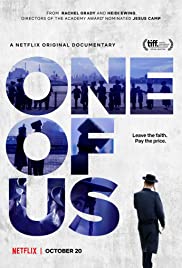
ONE OF US
US, 2017, 95 minutes, Colour.
Etty, Chani Getter, Ari Hershkowitz, Luzer Twersky.
Directed by Heidi Ewing, Rachel Grady.
In a number of fiction stories set in the Hassidic community in New York City, especially in Brooklyn, Williamsburg. In the past there was the film version of Chaiam Potok’s The Chosen in the 1980s. Then there was the striking limited series, Unorthodox, in 2020. Unorthodox, particularly, embodied all the elements portrayed in documentary fashion in One of Us.
There is quite a deal of visual background of life in the Hasssidic communities, in the synagogues, in the gatherings, the dancing of the men with the women outside watching and taking photos, the families together, in the streets.
There is great deal shown about the origins of these communities after World War II, the impact of the Holocaust, large families as compensation for the losses during the Holocaust. There is little education amongst the communities, especially for women. The women are dominated by their husbands and this kind of domination leads to a great deal of violence in the house, physical and psychological abuse. And, there is the indication that the courts of New York City make presumptions in favour of the Father and the community, the community finding all ways in law to protect their members. And, there is no Internet or worldly activities.
This film focuses on three, two men and a woman, who want to leave the community and are supported by a New York group, Footsteps, who have helped these three make transitions. The film also includes a number of talking heads, especially men and rabbis who are sympathetic to those they interview even though disagreeing with their choices. There are also support groups who offer celebrations and meals for those disaffected but who feel the need for some kind of continuance with their religious upbringing and to identify with being Jewish even if they say they are not religious.
Etty is the woman concerned, physical abuse from a dominating husband, leaving with her children, finding a new life. She is supported by her lawyer, Chani Gettner. In the interviews with Etty, there are explanations of what life in the community was like, with her husband, the dominance of the community, ultimately court cases in which she loses the custody of her children except for one supervised hour per week.
The older of the two men, Luzer, finds that he has lost his religious fervour, some of his beliefs, has walked away from his wife and family, has ambitions for acting both in California and in New York City, is shown doing interviews, discussions with some of the Jewish elders, some rehearsals, some recitations. He also examines documents and photos from his past, some affection from his father, his mother seeming to accept, by phone, his loss of being religious but then not speaking to him for years.
The younger man, Ari, is shown cutting off his locks, having a haircut, changing his clothes, separating himself from the community. He explains that he was raped by one of the authorities at a summer camp, made representations, but nothing was done and the man was still in authority at the camps. The film shows his moving to Florida, his searching out alternative religious styles, visiting a Pentecostal church, discussing in great detail what is like to be a young person cut himself off from the community, trying to find some meaning for his life.
At 95 minutes running time, this is an accessible opportunity to see something of the Hassidic communities, their religious beliefs and practices, their way of separate life, and the effect of the ex-Hassidic men and women.